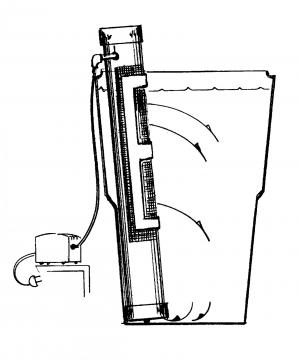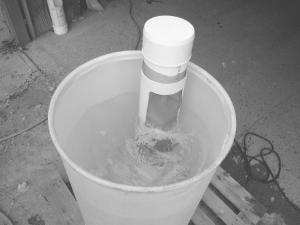Brewer Makes Tasty Compost Tea
"Compost tea" is mighty tasty to soil microorganisms and growing plants, but only if it's brewed right. Make a mistake, and it may have no value or even be dangerous to plants, says Paul Sachs, North Country Organics, Bradford, Vermont.
Interest is growing in compost tea, which is made by "brewing" compost. The resulting liquid is applied directly to gardens or crops.
Making quality compost tea is where the Bobolator sold by North Country comes in. Sachs says the concept was developed by Robert Norson, an organic grower in Washington State.
"Lots of compost tea brewers bubble air from the bottom of the tank up through the water to a "tea" bag at the top," says Sachs. "The roiling water is designed to move through the bag and extract the microbes."
The dissolved oxygen is needed for growth of the organisms feeding on the compost. Insufficient oxygen can reduce growth or worse, replace beneficial aerobic bacteria with undesirable anaerobic organisms.
Once the tea is made, the saturated water is applied to plants and/or plant root zones. There the bacteria compete with, antagonize or even parasitize parasitic soil organisms. If the tea is properly balanced, it contains fungi that are equally beneficial. The key is to get optimum fungal and bacteria growth in the tea, and that requires optimal air flow and quality compost.
The Bobolater puts the two together. It consists of a chamber with a fine mesh screen-covered opening on the side. An air tube assembly carries air from a pump into the bottom of the chamber. Water intakes at the bottom of the chamber help maintain a current through the chamber. Before inserting the tube into a tank or pail, the appropriate amount of compost is dropped into the chamber and a cap is placed over the top.
"When air is driven into the chamber, the bubbles are constantly tumbling the compost to make extraction easy."
Once optimal quality tea has been made, the chamber is removed and the air tube is taken out. The tube is then returned to the tea to keep it aerated until application.
Another advantage of the Bobolator is its ability to make only the needed amount of tea. Most commercial units tend to be fixed batch type. The smallest Bobolator can make 5 to 25-gal. batches while the larger Bobolator can make from 25 to 250 gal. at a time. Only three cups of compost can produce five gallons of high quality tea while five cups can produce 12 gallons.
North Country offers recipes for different plants. Some plants such as trees, shrubs, strawberries, rhododendrons and vines benefit more from a higher rate of fungal organisms. Others such as cole and brassica crops prefer a higher rate of bacteria.
The company markets a high quality compost for use with the Bobolators. They also sell micronutrient, bacterial and fungal boosters and other accessories.
Contact FARM SHOW Followup, North Country Organics, P.O. Box 372, Depot Street, Bradford, Vt. 05033 (ph 802 222-4277; websites: www.norganics.com and www.soilfoodweb.com).

Click here to download page story appeared in.
Click here to read entire issue
Brewer Makes Tasty Compost Tea SPECIALTY/SERVICES Specialty/Services 28-3-40 "Compost tea" is mighty tasty to soil microorganisms and growing plants, but only if it's brewed right. Make a mistake, and it may have no value or even be dangerous to plants, says Paul Sachs, North Country Organics, Bradford, Vermont.
Interest is growing in compost tea, which is made by "brewing" compost. The resulting liquid is applied directly to gardens or crops.
Making quality compost tea is where the Bobolator sold by North Country comes in. Sachs says the concept was developed by Robert Norson, an organic grower in Washington State.
"Lots of compost tea brewers bubble air from the bottom of the tank up through the water to a "tea" bag at the top," says Sachs. "The roiling water is designed to move through the bag and extract the microbes."
The dissolved oxygen is needed for growth of the organisms feeding on the compost. Insufficient oxygen can reduce growth or worse, replace beneficial aerobic bacteria with undesirable anaerobic organisms.
Once the tea is made, the saturated water is applied to plants and/or plant root zones. There the bacteria compete with, antagonize or even parasitize parasitic soil organisms. If the tea is properly balanced, it contains fungi that are equally beneficial. The key is to get optimum fungal and bacteria growth in the tea, and that requires optimal air flow and quality compost.
The Bobolater puts the two together. It consists of a chamber with a fine mesh screen-covered opening on the side. An air tube assembly carries air from a pump into the bottom of the chamber. Water intakes at the bottom of the chamber help maintain a current through the chamber. Before inserting the tube into a tank or pail, the appropriate amount of compost is dropped into the chamber and a cap is placed over the top.
"When air is driven into the chamber, the bubbles are constantly tumbling the compost to make extraction easy."
Once optimal quality tea has been made, the chamber is removed and the air tube is taken out. The tube is then returned to the tea to keep it aerated until application.
Another advantage of the Bobolator is its ability to make only the needed amount of tea. Most commercial units tend to be fixed batch type. The smallest Bobolator can make 5 to 25-gal. batches while the larger Bobolator can make from 25 to 250 gal. at a time. Only three cups of compost can produce five gallons of high quality tea while five cups can produce 12 gallons.
North Country offers recipes for different plants. Some plants such as trees, shrubs, strawberries, rhododendrons and vines benefit more from a higher rate of fungal organisms. Others such as cole and brassica crops prefer a higher rate of bacteria.
The company markets a high quality compost for use with the Bobolators. They also sell micronutrient, bacterial and fungal boosters and other accessories.
Contact FARM SHOW Followup, North Country Organics, P.O. Box 372, Depot Street, Bradford, Vt. 05033 (ph 802 222-4277; websites: www.norganics.com and www.soilfoodweb.com).
To read the rest of this story, download this issue below or click
here to register with your account number.









